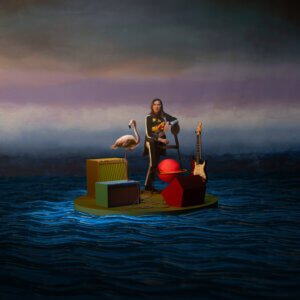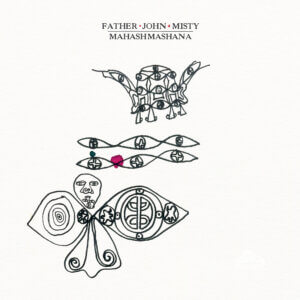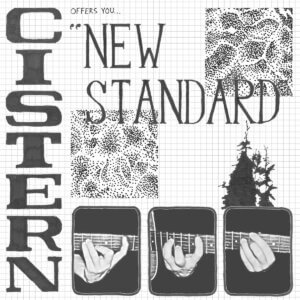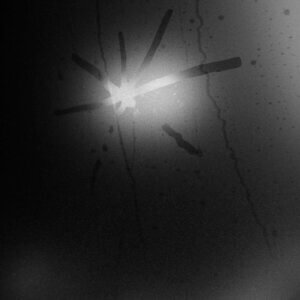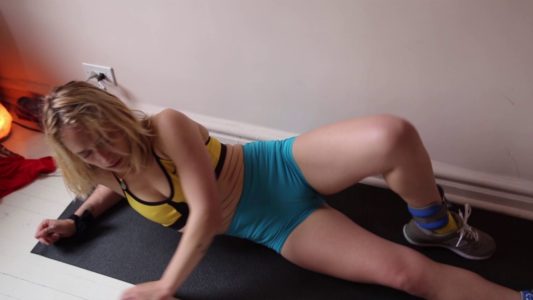Oropendola Gives Song-By-Song breakdown of Waiting For The Sky To Speak
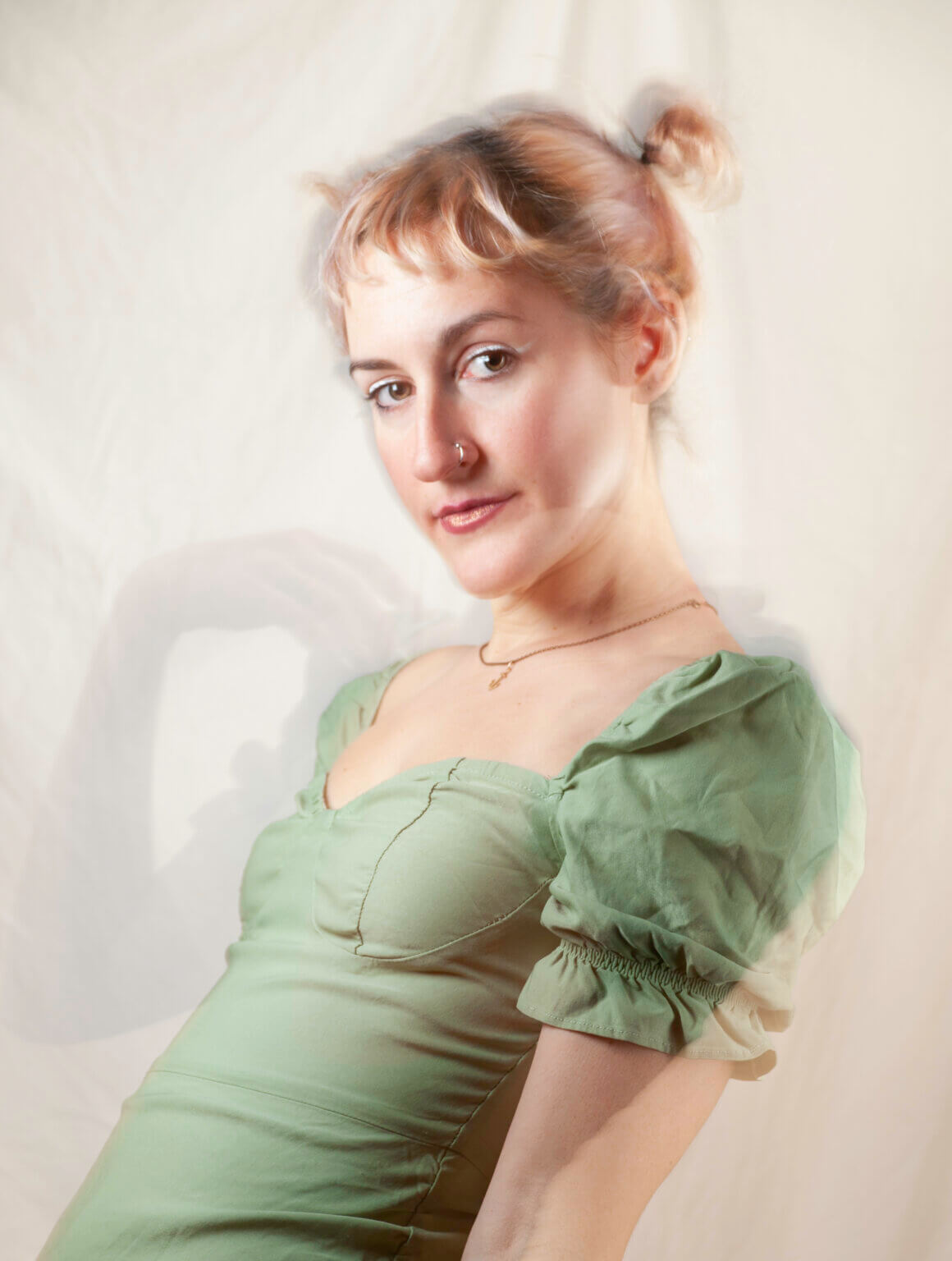
Brooklyn artist Oropendola, known for their work with Half Waif, Barrie, Samir Langus, has shared a track by track breakdown of their brand-new album Waiting For The Sky To Speak. The full-length is out today via Spirit House/Wilbur and Moore Record. Oropendola, recently shared a video for “Rorschach Sky.”
Rorschach Sky
Gazing up at the clouds, how could there ever be just one shape, one interpretation, one story? If you’re waiting for some kind of answer from the sky, you’re not seeing the beauty, the motion, the possibility in every passing moment. I wrote this song in the early pandemic after witnessing my kitchen clock moving backwards (…while, fittingly, watching Twin Peaks). Texturally and harmonically, the song shifts between what feels like a surreal dream state (constantly wriggling out of its tonal center, if there is one) and the more grounded, groovy pop refrain, eventually turning into a sort of frenetic celebration. Many of the arrangements on this album were propelled by finding one particular sound that led to a domino effect of ideas: in this case, a Casio run through a vocoder plug-in. When I first wrote “Are we finally off the hook?” – the main, er, hook – I worried it was corny, but I (and my roommates) simply couldn’t stop singing it. The line, an earnest, accidental pun, came from feeling a real taste of what it could mean to have time. To sit, to do nothing, to frolic, to create, to dream. A beckoning away from the capitalist machine, the go-go-go, the linear, towards a freer, open circle. Coming back to ourselves and each other.
Flowers on My Front Stoop
I was a touring member of the band Barrie in 2019 and got super inspired by her melodically and rhythmically infectious keyboard parts. In the van one night driving from Seattle to Boise, I dug out the keyboard, plugged in some headphones, and wrote this upbeat poppy chord progression: an invigorating, welcome pivot from my songwriting style at the time. A breakup directly after tour gave the music its fuel. Originally called “I’ll Probably Feel Better,” it seemed too cheeky and flippant for the title, and I opted for the contrasting sincerity of “Flowers on My Front Stoop.” Before the two of us started seeing each other, he left an assortment of colorful hardware store flowers on my front stoop, which I recall thriving through many of our ups and downs. This is the very first song that co-producer Zubin Hensler and I produced and arranged together, and the wild, yet polished, everything-and-the-kitchen-sink production that ensued very much informed the making of the rest of the record, including flugelhorn and clarinet arrangements, pieced-together percussion worlds, and phaser-inflected vocals.
Knocking Down Flowers
In January 2020, I started recording myself improvising every morning – “morning pages” inspired by The Artist’s Way, a creative self-help book. “Knocking Down Flowers” came from morning pages #1, after the aforementioned pivotal on-and-off relationship had reached its end. There was a construction site near my old apartment in South Slope, Brooklyn that the two of us would often pass by. We developed a bit – bittersweet in retrospect – that it was our home. We would peer through the diamond-shaped opening at the stunted barren landscape beyond and imagine the possibilities of our weird little insular paradise. I captured that spot with a zoom mic during the recording process, and pieces of it – the hiss of a braking bus, the droning hum of the Prospect Expressway – made their way into the rhythmic landscape of the track. Some of the melodic arrangement was inspired by visual ideas, which eventually led to a music video, a new medium for me. I imagined a sweeping, romantic waltz section, prompted by the memory of the two of us frolicking around “our home” when the door was left ajar. There is a certain type of pleasure, and comfort, gleaned from inhabiting liminal space. Suspended in midair, everything takes on a bit of a hazy, yet tantalizing, glow. You are just of this moment, no obligation to the past or future. Not quite here, not quite there, you don’t have to choose. If you don’t have to choose, you don’t have to make the wrong choice. If you knock down the flowers before they bloom, you don’t have to watch them wilt.
Trust the Sun
I wrote Trust the Sun in the deep isolation of the pandemic, missing and mourning lost friends and lovers, parsing out patterns and pain that I had previously avoided facing. There is a certain weight and vulnerability to this song that makes the vocals feel especially pertinent. While working on it in the studio, Zubin referenced FKA Twigs as an example of incredible vocal-centered production, and I got quite into her music around this time. One original production thought was to steer away from the piano ballad feel of the demo, though we ultimately came back to it, surrounding it with layered synths and pumping bass. This was a tough – but gratifying – one to record lead vocals for. We ended up having 4 vocal sessions over the course of 3 months and piecing together parts of all of them – each inevitably coming from wherever I was at the time. Raw and emotional, wispy and fragile, calm and focused. In retrospect, it’s fitting: Trust the Sun started as a lament, a plea, but eventually, it became a mantra.
Shimmy Up, Melt Down
Over time, I have struggled with my moods, worrying that I exist on too-extreme planes. This song embraces the pleasure of the pendulum swing; it is a celebration of living at the intersection of contrasts and a big triumphant “WE CONTAIN MULTITUDES.” I usually play and sing at the same time when I’m in songwriting mode, but for this song, I initially had to record a voice memo of the samba-like keyboard part in order to effectively experiment and find the most fitting interlocking vocal parts. This is the only song that already had almost-fully-composed bass and drum parts, but, as with all the other songs, we didn’t fully crack the rhythm section code and get it all in there until the entire rest of the song was arranged. It was a funny thing, appropriate for the theme of the album actually, having all these upbeat songs waiting for so long to fully find their grounding and motion. The “dollar dancing shoes” in this song are a pair of vintage Keds that I got for $3 on tour in Fresno, CA.
Drop the Stone
The phrase “drop the stone” is uttered just once in the song – I saw it as a letting go. (I then googled the phrase and found religious, psychological, and bathroom-adjacent confirmation.) Oftentimes when I’m in the midst of writing a song, I can’t do anything but. Can’t eat, drink, sleep, think, breathe, unless it’s connected to the songwriting. Zubin and I had a session scheduled when I had just finished the song, and I felt completely high on it when I walked into the studio. I probably just shouted out something like, “I WROTE A SONG, I NEED TO GO PLAY IT, BYE” and holed up with the piano. I didn’t initially have any arrangement ideas, but the synth that starts Half Waif’s “Lavender Burning” came to my mind – I wanted to conjure a similarly slow but urgent burn. Recording percussive breath through the length of the song glued together the drums and shaker, and made me feel so present and wild. (Beatboxing was a crucial tool throughout the album-making process to come up with rhythmic ideas.) The far-away siren-like vocals in the beginning and middle are actually the first line of the song – “Can you feel the season of Demeter” – transposed up the octave and put in reverse. I sang the lead vocals with the lights off in the control room, thinking of embracing the perspective of being the villain. Turning angst into agency felt powerful.
At the Edge of It
The original version of this song was fully improvised on a Boss RC 300 looper in my bedroom: 6 layered loops with a heartbeat rhythm tapped on the microphone, lead vocals weaving their story alongside. It was a stream-of-consciousness meditation on memory and time-passage, finding comfort and kinship in the flow and inevitability of the river, of the sea. Though the studio had a separate recording room, I usually preferred to record in the control room. For this one, I cozied up on the couch with a blanket and I think the whole track was done in one take. I believe it was Zubin’s idea to have a bunch of friends sing the bed of loops with me. 19 singers – friends as well as my mom and sister – lent their voices, recording remotely. A few of them also improvised over the full track. It is meaningful beyond words having so many loved ones’ voices throughout this song. (And so many musicians throughout this whole album! A godsend during such an isolating time.) Zubin asked me to do a sort of conceptual free-write about the song, in order to inform the production. I wrote of a long blinding white corridor with glass walls on either side, like an aquarium, whispers and murmurs of loved ones ricocheting unintelligibly. I wrote of a large, seemingly endless, glittering body of water with mysterious figures down below. (I actually always think of the pensieve from Harry Potter around the line “sometimes I sit at the edge of it / try to reach my hand in, oh but I’m scared.”)
For Winslow
This is the only song on the album that I wrote and played on guitar. It’s uncommon for me to write a cappella but I finished the lyrics and melody for the first verse and chorus while walking home and found the [very simple, compared to my other tunes] chords once I walked in the door. I love improvising and writing on instruments that I don’t know very well. I find I expect less of myself and the instrument, and feel a different kind of freedom. Writing this song was essentially writing a letter, which makes it feel especially direct and personal. I love super detailed lyrics that take you on little twists and turns, and it felt exciting to go from a semi-trite line like “I’m always stuck in my head” to “I’m always stuck in my pride” and finally “I’m always stuck in my heart.” Arrangement-wise, because it was so simple and open, it could have potentially held a lot, but I felt strongly about keeping it small and a little unconventional, keeping it true to the song itself. We decided to record lead vocals directly into a pair of headphones in place of a microphone, in order to get a more raw, lo-fi sound.
AHFTKC
I think this is the most fun I’ve ever had writing a song. It became the ‘ode to motels and liminal spaces’ I had always dreamed of writing. A total playground for any and all musical and lyrical ideas, a portal out of my damn head and into my imagination. I love eccentric yet poignant short stories – ie Miranda July, Lorrie Moore, Richard Powers – and this song kind of feels like one. I would usually write at my Korg SV1 keyboard, but this time I found a particularly visceral sound on a Juno DS that catapulted me into a totally different place (very different from what ended up on the recording). It’s incredible what can come out of us when we shake things up a bit. The repetition of the phrase “memory in the muscles” serves as a sort of mantra that feels applicable for the whole album, and was originally a consideration for the album title. The rhythm section is built off of a re-amped Casio beat, with a rolled cymbal on the choruses, and eventually, a wild, cut-up drum performance and distorted bass. Bum Bum, a man whose voice mysteriously – initially hilariously, and later frustratingly – made his way through Zubin’s speakers from time to time (the prevailing theory was that he was a truck driver whose signal we were picking up) also made an important cameo. We combed through our Bum Bum footage until we found him saying “Eventually” and put it into the outro. PS: See if you can figure out what AHFTKC stands for.
Chrysalis
At some point in the later stages of the recording process, it was feeling like something wasn’t quite right about the overall album flow. It was missing something, and Zubin suggested adding another track. I plucked “Chrysalis” from the initial bunch of 19 demos that I sent him when we first chatted about making an album, and it turned out to be the missing piece, the crucial element. “Aren’t we tired of waiting in the chrysalis?” the song asks, a mirror of the album title long before the title existed. Other lyrics seem to harken back to the stoop in “Flowers on my Front Stoop,” the loitering lovers of “Knocking Down Flowers.” (I love when that happens. None of these songs were ever intended to go together; the threads were found later on.) The sonic atmosphere came quickly and naturally, a combination of the Nord Wave, piano, and vocals. It feels still and sacred, a deep breath after an album full of movement, before it enters its own chrysalis.
When You Carried Me
There is a memory from my childhood that makes me feel safe and comforted. I remember seeing a Disney movie outdoors in Central Park in the summertime with my mom, dad, and sister. I fell fast asleep by the end of it, and my dad carried me to the car with my head resting on his shoulder. A simple expression of love and care, but even then, I think I knew it as unconditional. I wrote this song at a time when I needed to remember how to come home; I had drifted far, far away. My friend Emma helped me finish writing it, which I love; I rarely work on my songs with other people. Zubin rented an upright piano for his then-studio shortly after we started working together, and it was a special thing to go to the city with him and help him pick it out, having that piano become such an integral part of the record. The instrumentation grew out of a wonderfully shitty tremolo Logic guitar, inspired by my pandemic Twin Peaks obsession. The first verse/chorus is the only part of the whole album that was recorded completely live. After that, I recorded the rest of the piano part without a metronome, and Zubin actually ended up going in and meticulously mapping out the tempo, measure by measure, in order to be able to add other instruments with a click. It feels so good, so right, to end this album – directly out of its chrysalis – with some clarity, groundedness, and hope: “Sun over the water, the light we knew would always guide us.”
Order Waiting For The Sky To Speak by Oropendola HERE
Latest Reviews
Tracks
Advertisement
Looking for something new to listen to?
Sign up to our all-new newsletter for top-notch reviews, news, videos and playlists.
